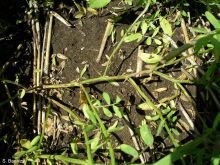Sales continue to fall, but the pulse industry says plant-based meat sector makes up a small part of pea protein market
Plant-based meat sales continue to slump in the United States, according to a new report.
Sales for the meat alternatives amounted to 19.8 million kilograms for the 52 weeks ending July 2, 2023, according to a CoBank report, which used data provided by Circana.
That is down 21 percent from the previous year and well off the 2021 high of 26.8 million kilograms.
“Consumers remain interested in the concept of plant-based meats, but concerns about highly processed products and higher prices have put off many prospective regular customers,” stated the report.
Read Also

Crop quality looks good this year across Prairies
Crop quality looks real good this year, with the exception of durum.
Julianne Curran, vice-president of market innovation with Pulse Canada, said many people who tried plant-based meat products felt they failed to mimic the taste of animal-based products.
“It’s really hard to meet consumer expectations for a meat analog product,” she said.
“They prefer the real thing. The plant-based alternatives are not performing to their satisfaction. They don’t like the taste.”
Companies are busy with research and development efforts aimed at closing that gap.
Curran said the disappointing sales numbers for plant-based meats will not affect the new market development targets set by Pulse Canada for new uses for pulses.
She noted that only a small volume of pea protein is used in those products, and it is a category with low consumption levels anyway.
Dairy alternative products use a lot more pea protein, and the sector is also encouraged by the potential for using pulse products in staple foods such as pasta, bakery goods, cereals, crackers and snacks.
Those categories have the potential to use large volumes of pulse proteins, flours, fibres and starches.
Western Canada will have roughly 500,000 tonnes of pulse fractionation processing capacity once construction of all the plants is complete, and that is probably a conservative estimate, said Curran.
She said the plant-based meat category is just one market for the products produced by those plants.
But it has several obstacles to overcome, according to the CoBank report. One of the main ones is that plant-based meat is often priced several dollars a pound higher than equivalent animal protein products.
Inflation has also played a big role in the sales decline because consumers tend to gravitate toward more familiar food during times of economic turmoil.
The period of consumer trial that boosted sales in 2021 “appears to have come and gone,” said CoBank.
“Put simply, aside from category devotees, plant-based alternatives to meat are occasional purchases rather than household staples,” stated the report.
The good news for plant-based meats is that many Americans are flexitarians who dabble in different types of diets, widening the audience for the products considerably.
However, there needs to be innovation around taste and mouth feel of the products. Fewer than half of Americans who tried plant-based meats repeated their purchase, according to the research firm Mintel.
Consumers are also turned off by the extensive lists of product ingredients, which they consider unhealthy.
As a result, brand messaging for the products has pivoted from better-for-you to better-for-the-environment, according to CoBank.
A United Nations Environment Programme report says animal products cause higher emissions than plant-based alternatives.
















